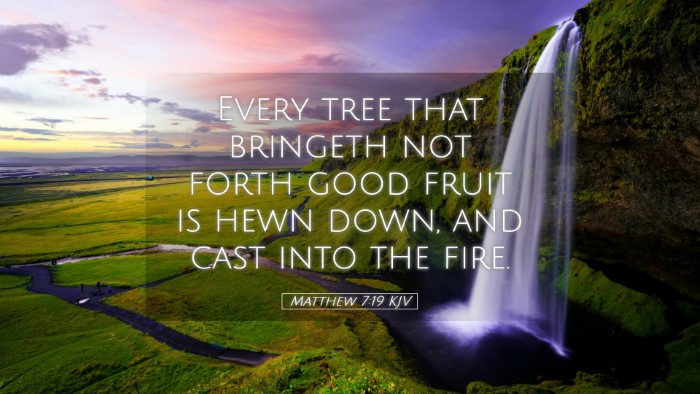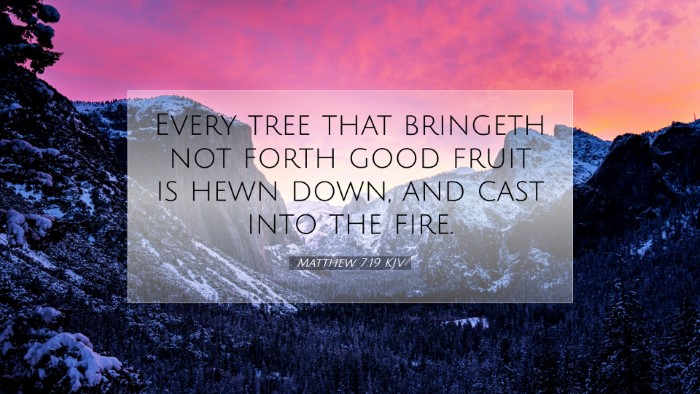Commentary on Matthew 7:19
Matthew 7:19 states: "Every tree that bringeth not forth good fruit is hewn down, and cast into the fire." This verse encapsulates the serious judgment that awaits those who fail to produce good fruits in their spiritual lives. In examining this verse, we glean valuable insights from various public domain commentaries, which provide a robust understanding suitable for pastors, students, and scholars.
Contextual Overview
This verse occurs within the Sermon on the Mount, where Jesus teaches about true righteousness and the falsehood of pretended piety. The imagery of trees and their fruit serves to illustrate the reality of one’s spiritual state. As Matthew Henry observes, the metaphor of trees producing fruit is a customary biblical symbol, denoting the outcomes of one’s faith and actions.
The Nature of the Tree
Henry points out that the tree metaphorically represents people, particularly Christians, who are expected to bear good fruit—namely, the fruits of the Spirit as outlined in Galatians 5:22-23. Adam Clarke elaborates on this by asserting that just as a tree is known by its fruit, a true follower of Christ will demonstrate their faith through their deeds. A tree that fails to produce good fruit is indicative of a poor spiritual condition.
Types of Fruit
- Spiritual Fruits: Good conduct, love, joy, peace, and moral integrity.
- Evangelistic Fruits: Bringing others to faith in Christ through effective witness.
- Discipleship Fruits: Growth in grace and knowledge, leading others in discipleship.
Clarke emphasizes the necessity of these fruits being evident in the life of a believer as an outworking of their faith. If a tree is barren, it is not merely a suffering tree; it is destined for destruction, reflecting the ultimate consequence of an unfruitful life.
Judgment and Consequences
The phrase "hewn down, and cast into the fire" signifies a divine judgment that is both severe and final. Barnes elaborates that the cutting down of a tree is indicative of a decision made after sufficient evaluation of its fruit. In the spiritual realm, there is an expectation that God's people will be fruitful and, when they are not, they stand under His judgment.
Implications for Believers
In light of this verse, there are several serious implications:
- Examination of Life: Believers are called to examine their lives closely, assessing the fruits they produce.
- Urgency of Bearing Fruit: There is a pressing need for spiritual readiness and active participation in the work of God.
- Warning Against Hypocrisy: Jesus’ teaching warns against the hypocrisy of professing faith without evidencing its fruits.
Tradition of Interpretation
Across church history, this verse has been interpreted as a clarion call to genuine discipleship. It challenges the complacent attitude often seen within religious circles. Henry notes that the fire depicted here symbolizes the final judgment, a repeated theme throughout Scripture, reflecting the eternal consequences of one’s spiritual choices.
Application in Ministry
For pastors and theologians, the implications of this verse extend beyond personal accountability. They are called to teach congregations about the importance of genuine faith that results in good works.
Furthermore, this verse acts as a motivation for evangelism. As Clarke points out, understanding the dire circumstances of unfruitfulness should urge believers to reach out to others, affirming their role in the Great Commission.
Conclusion
Matthew 7:19 serves as a sobering reminder of the principles of accountability, judgment, and the responsibilities of the believer. The combined insights of Henry, Barnes, and Clarke remind us that every Christian is called to produce good fruit—evidence of a transformed life in Christ. Ultimately, the teaching is not only corrective but also motivational, guiding us towards a fruitful life that glorifies God and fulfills the calling upon His people.


